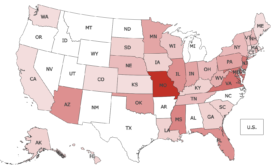 West Virginia state Senator Jack David Woodrum (photo on left) told attendees at the West Virginia Press Association (WVPA) convention last month that he may introduce a bill that would reduce fees for papers in the state that fail to publish notices on their own website and on WVPA’s statewide public notice site, according to a report on WVPA’s member website. The legislation wouldn’t change current laws requiring most notices in the state to be published in local newspapers.
West Virginia state Senator Jack David Woodrum (photo on left) told attendees at the West Virginia Press Association (WVPA) convention last month that he may introduce a bill that would reduce fees for papers in the state that fail to publish notices on their own website and on WVPA’s statewide public notice site, according to a report on WVPA’s member website. The legislation wouldn’t change current laws requiring most notices in the state to be published in local newspapers.
Celebrity announcements show power of newspaper notice
 Most news junkies will remember the summer of 2024 for the dramatic events that unfolded in the run-up to this year’s presidential election. For public notice geeks, however, it will be remembered as the Summer of Celebrity Notices.
Most news junkies will remember the summer of 2024 for the dramatic events that unfolded in the run-up to this year’s presidential election. For public notice geeks, however, it will be remembered as the Summer of Celebrity Notices.
Over the last three months, the normally mundane world of public notice intersected with celebrity culture in three big stories that generated a tremendous amount of coverage. The individuals who placed or were party to the ads would have preferred to keep their business secret, but that’s not how newspaper notice rolls.
Wichita moves notices to city website but adds new “print source”
 Wichita became the latest and most significant municipality in Kansas to approve a charter ordinance anointing the city’s website as its “official newspaper.” But the new ordinance came with a twist: It included a provision calling for the city to also publish its notices in a “secondary print source.”
Wichita became the latest and most significant municipality in Kansas to approve a charter ordinance anointing the city’s website as its “official newspaper.” But the new ordinance came with a twist: It included a provision calling for the city to also publish its notices in a “secondary print source.”
Wichita is at least the fifth municipality in Kansas to replace its official newspaper with the city website despite a state law requiring notices to be published in a local paper. Attorney General Kris Kobach gave them the green light when he issued a legal opinion last year declaring that home-rule provisions in the state’s constitution “allows cities to exempt themselves from nonuniform acts of the Legislature.” (As the last sentence in the opinion notes, website notice isn’t sufficient when a particular type of notice is specifically mandated by statute, e.g., budget notices, treasurer’s reports, etc.)
Town’s choice of official newspaper upheld in Connecticut
 The Connecticut Supreme Court held last month that a newspaper used for decades by the tiny borough of Fenwick to issue its public notices qualified as an official newspaper even though the paper had no subscribers there.
The Connecticut Supreme Court held last month that a newspaper used for decades by the tiny borough of Fenwick to issue its public notices qualified as an official newspaper even though the paper had no subscribers there.
The ruling overturned an appellate court decision invalidating a zoning regulation for lack of sufficient notice because the paper failed to satisfy a state law requiring official newspapers to have “substantial circulation in the municipality.”
Maryland governor vetoes public notice bill, calls independent media ‘vital public interest’
 As the Maryland-Delaware-DC Press Association (MDDC) had urged him to, Maryland Gov. Wes Moore last month vetoed House Bill 1258, which would have required Registers of Wills in each county to publish estate notices on a government website instead of local newspapers. The bill passed unanimously in both houses of the state legislature before it was vetoed.
As the Maryland-Delaware-DC Press Association (MDDC) had urged him to, Maryland Gov. Wes Moore last month vetoed House Bill 1258, which would have required Registers of Wills in each county to publish estate notices on a government website instead of local newspapers. The bill passed unanimously in both houses of the state legislature before it was vetoed.
In his extraordinarily frank veto letter, the governor acknowledged that existing notice requirements “present a financial burden on local and state governments as well as individual citizens.” But he argued that rapidly eliminating a significant source of advertising revenue like probate notices would endanger local newspapers, the survival of which he called “a vital public interest.”
Press groups in Minn., Louisiana turn the tide
 April saw an uptick in legislative activity surrounding public notice issues as many states approached the date they’re scheduled to adjourn. Press groups in Minnesota and Louisiana found themselves in scramble mode as public notice bills they opposed began moving. Although neither situation has been completely resolved, they appear to be headed in the right direction for residents of each state who care about government transparency.
April saw an uptick in legislative activity surrounding public notice issues as many states approached the date they’re scheduled to adjourn. Press groups in Minnesota and Louisiana found themselves in scramble mode as public notice bills they opposed began moving. Although neither situation has been completely resolved, they appear to be headed in the right direction for residents of each state who care about government transparency.
- Minnesota
Indiana adopts digital-newspaper notice
 Indiana Gov. Eric Holcomb signed three bills last month that will impact the state’s public notice laws. When it takes effect on July 1, the most significant bill will make Indiana the first state to authorize government units to publish primary notice on some newspaper websites or e-editions.
Indiana Gov. Eric Holcomb signed three bills last month that will impact the state’s public notice laws. When it takes effect on July 1, the most significant bill will make Indiana the first state to authorize government units to publish primary notice on some newspaper websites or e-editions.
House Bill 1204, which passed both the House and Senate unanimously, allows local governments and state agencies to circumvent the print editions of most newspapers by posting notices in one of their digital products as an alternative. However, the bill only applies to newspapers that distribute fewer than four editions per week; print will remain the exclusive means for government notice in papers that are published more frequently.
Get to know your political representatives!
 One of the most important factors in maintaining newspaper notice is the strength of the relationships between local publishers and their representatives in the state legislature. The relationships don’t need to be particularly close. They don’t even need to be politically harmonious as long as there is a baseline of trust. Public officials who can put a face to their local paper are much more likely to consider its policy concerns.
One of the most important factors in maintaining newspaper notice is the strength of the relationships between local publishers and their representatives in the state legislature. The relationships don’t need to be particularly close. They don’t even need to be politically harmonious as long as there is a baseline of trust. Public officials who can put a face to their local paper are much more likely to consider its policy concerns.
February brings more evidence of shift to newspaper websites
 Last month provided additional confirmation that state legislatures are increasingly looking to newspaper websites rather than government sites to supplement and perhaps eventually serve as an alternative to printed newspapers as the primary medium for public notice. Bills illustrating that trend moved closer to becoming law in both Indiana and Iowa.
Last month provided additional confirmation that state legislatures are increasingly looking to newspaper websites rather than government sites to supplement and perhaps eventually serve as an alternative to printed newspapers as the primary medium for public notice. Bills illustrating that trend moved closer to becoming law in both Indiana and Iowa.
Indiana
The tenor of public notice legislation has shifted in Indiana. At the start of 2023 it was one of the two or three states that seemed most likely to abandon newspapers in favor of government websites. Yesterday the legislature approved a bill that could instead serve as a gateway to an eventual migration to newspaper websites.
Stop disparaging public notice advertising!
 Pay close attention to reporting on public notice issues and you may begin to observe that some papers have adopted certain rhetorical habits that tend to undermine the goal of preserving newspaper notice. They’re mostly innocent mistakes made by people who are unaware that what they’re doing may be counterproductive. But it’s fair to say that if those habits could be eliminated it might enhance the policy environment for maintaining newspaper notice.
Pay close attention to reporting on public notice issues and you may begin to observe that some papers have adopted certain rhetorical habits that tend to undermine the goal of preserving newspaper notice. They’re mostly innocent mistakes made by people who are unaware that what they’re doing may be counterproductive. But it’s fair to say that if those habits could be eliminated it might enhance the policy environment for maintaining newspaper notice.
